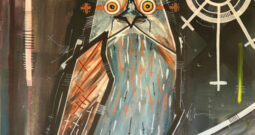from the editor's desk

Review of ‘The Players’ by Deborah Pike
Pike, Deborah. The Players. Fremantle: Fremantle Press, 2024. RRP: $34.99, 400pp, ISBN: 9781760993061.
John Byron
The debut novel of literary scholar Deborah Pike, The Players, is a warm, clear-eyed, funny and tender exploration of the tumult of early adult life. By turns amusing and serious, emotional and intellectual, quotidian and profound, The Players is also beautifully written on the line, with the lyricism of a lifelong, dedicated, thoughtful reader and teacher of literature.
In The Players, the eponymous group of young people spend a short but intense period together rehearsing a production of The Marriage of Figaro, a 1784 stage comedy by Pierre Beaumarchais that was immortalised by Mozart two years later when he put Lorenzo Da Ponte’s libretto to music. As for the play, so for the players: what seemed at the time to be a passing, whimsical entertainment sets the rhythms and melodies of the rest of their lives.
The players are a piebald collection of university students from different sides of the tracks, different continents, different circumstances and world views. They have come together at a particular moment in their lives, when they are exploring new ideas and ways of being, the future still feeling like an open field of possibility. The intense shared experience of the season of the play proves to be foundational for each of them—Veronika, Sebastian, Cassie, Josh and Gloria—as they stumble into and through adulthood, as mystified by their own desires and values as they are by an indifferent and illogical world.
Unfolding in short bursts of deeply immersive, alternating first-person perspectives, the novel takes seriously the labours of each player in deciding who or how they want to be. The Players belongs to a venerable canon of respectful exploration of the travails of young adulthood, when time is running out and you find yourself having to commit to a way of being. The novel shows how we set our courses on lessons learned almost by accident.
For all that, there is plenty of fun in The Players, centred mainly around romantic confusions of the Much Ado About Nothing kind—and, of course, The Marriage of Figaro itself. With beautiful timing, Pike intersperses moments of light operatic melodrama with gentle beats of poignancy, such as in the closenesses Cassie encounters over the course of the story. Though it is worth pointing out, too, that the novel is not all human drama: around the players is the stage that is the world. Drawing on her upbringing in Western Australia, Pike has captured the wild beauty of the West Australian landscape, its way of seeping into your being and transforming how you move through it in both space and time:
The place continued to astonish […]: such bright sun, vistas that seemed to vanish into endless light. A city of horizons. [.…] this was a place of possibility, where space unfurled without end. It went to your head, as if you could climb the sky. (50)
Scenes abroad, in the capitals of Europe, are equally evocative of the particularities of cities, of how it is to live in them if you are young, passionate, adrift and poor:
They walked past the Place Maubert. The market was finishing up: she could smell the rotten fruit and sour milk. Dirty lettuce leaves blew along the pavement. Men were shifting cardboard boxes into vans, and there were stray cats gleaning from toppled bins. They turned up a street with a steep incline and cobblestones. […] They crossed a courtyard, passed through glass doors, then up four flights of a narrow stairwell. It was as familiar to her now as breathing, and yet every time she thought of the thousands of feet, millions, who had walked this way before her. (232–233)
Or there is that slightly hollow plunk underfoot when a colonial lands her Blundstone on the staircase of British respectability, irresonant as a dead piano key:
Cassie alighted from the bus, hugging her parcel, wanting a thicker coat. She lugged her way to their tiny house, climbed the stairs to the front door […]. She loved the oldness of the place: its green flaking taps, a rusty sink, a prehistoric bathroom with cracked tiles. It felt trapped in time […]. But Cassie was glad to call it home. (253)
‘But’, indeed. That storied antipodean desire to belong at the centre of a flamed-out Empire: likely doomed, perfectly unrequited.
Across the novel, the players each respond differently to the confronting reality that they alone must shape the meaning of their lives—taking responsibility, if they are able, not only for who they are but for the legacies they inherit. Each finds a way to build a life that either escapes or honours (as the case may be) the soil it is grown from. The payoff comes in the last quarter of the novel, heralded by a deeply moving chapter that constitutes the moral hinge of the book. Because, in The Players, it is not the places that matter, but the people. It is they who save one another, and (for the most part) themselves. It is they who finally realise, ‘That all we really needed to do was take care of one another. Live each day as if it were a miracle’ (388).
John has degrees in English Literature from the Universities of Adelaide and Sydney. His novel, The Tribute, was published by Affirm Press in 2021.





